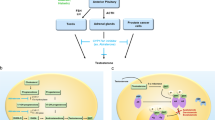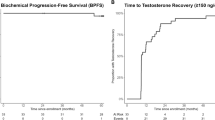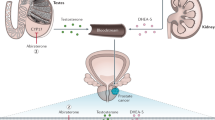Abstract
Hormone therapy remains central to the management of advanced prostate cancer. Evidence has accrued to suggest benefits from earlier treatment. Trials which demonstrate significant improvements in disease-specific survival may be underpowered to show overall survival benefits, due to the effect of mortality from unrelated causes. Toxicity, particularly the risk of osteoporosis, causes increasing concern, particularly where many years of use may be contemplated as in early relapse after curative treatment. Strategies to reduce toxicity include use different drugs, notably antiandrogens and with renewed interest in oestrogens in low dose or administered parenterally, and deferred and intermittent treatment. Further improvements in drug development, reducing toxicity, and identification of the cause of hormone refractory disease and its prevention would revolutionise the use of hormone therapy. Currently, deferred treatment, used selectively and with careful follow-up, remains an option for selected patients.
This is a preview of subscription content, access via your institution
Access options
Subscribe to this journal
Receive 4 print issues and online access
$259.00 per year
only $64.75 per issue
Buy this article
- Purchase on Springer Link
- Instant access to full article PDF
Prices may be subject to local taxes which are calculated during checkout


Similar content being viewed by others
References
Rabbini F, Gleave ME . Treatment of metastatic prostate cancer: endocrine therapy. In: Hamdy FC, Basler JW, Neal DE, Catalona WJ (eds.) Management of Urologic Malignancies, Churchill Livingstone, Edinburgh, 2002; pp. 210–226.
Medical Research Council Prostate Cancer Working Party Investigators Group. Immediate versus deferred treatment for advanced prostatic cancer: initial results of the Medical Research Council Trial. Br J Urol 1997; 79: 235–246.
Bolla M et al. Improved survival in patients with locally advanced prostate cancer treated with radiotherapy and goserelin. N Engl J Med 1997; 337: 295–300.
Nelson JB, Lepor H . Prostate cancer: radical prostatectomy. In follow-up strategies and management in urologic oncology Urol Clin N Am 2003; 30: 703–723.
See WA et al. Bicalutamide as immediate therapy either alone or as adjuvant to standard care of patients with localised or locally advanced prostate cancer: first analysis of the early prostate cancer program. J Urol 2002; 168: 429–435.
Schröder FH . Endocrine treatment of prostate cancer—recent developments and the future. Part 1: maximal androgen blockade. Early vs delayed endocrine treatment and side effects. Br J Urol Int 1999; 83, (European Urology Update Series) 161–170.
Holberg L et al. A randomised trial comparing radical prostatectomy with watchful waiting in early prostate cancer. N Engl J Med 2002; 247: 781–789.
Prostate Cancer Trialist's Collaborative Group. Meta-analysis of trials of immediate versus deferred hormone therapy in prostate cancer (unpublished data)..
Soloway MS et al. Zoladex versus orchiectomy in treatment of advanced prostate cancer: a randomised trial. Urology 1991; 37: 46–51.
Kaisary AV et al. Comparison of LHRH analogue (Zoladex) with orchiectomy in patients with metastatic prostate cancer. Br J Urol 1991; 67: 502–508.
Botto H, Richard F, Mathieu F, Camey M . Decapeptyl in the treatment of metastatic prostatic cancer. Comparative study with pulpectomy. In: Prostate Cancer, Part A: Research, Endocrine Treatment, and Histopathology. Alan R Liss, Inc, 1987; pp. 199–296.
The Leuprolide Study Group. Leuprolide vs diethylstilbestrol for metastatic prostate cancer. N Engl J Med 1984; 311: 1281–1286.
Mahler C . Is disease flare a problem? Cancer 1993; 72: 3799–3802.
Ellis WJ, Grayhack JT . Sexual function in aging males after orchiectomy and estrogen therapy. J Urol 1963; 89: 895–899.
Radlmier A, Bormacher K, Neumann F . Hot flushes: mechanism and prevention. Prog Clin Biol Res 1990; 359: 131–140.
Morley JE, Kaiser FE, Hajjar R, Perr III HM . Testosterone and frailty. Clin Geriat Med 1997; 13: 655–695.
Gardiner RA et al. Cognition and hormonal manipulation in prostate cancer. Br J Urol Int 2000; 86 (Suppl 3): 218–219.
Daniell HW . Osteoporosis after orchiectomy for prostate cancer. J Urol 1997; 157: 439–444.
Hamdy NAT . The use of bisphosphonates in prostate carcinoma metastatic to the skeleton. In: Hamdy FC, Basler JW, Neal DE, Catalona WJ (eds). Management of Urologic Malignancies. Churchill Livingstone, Edinburgh, 2002; pp. 244–248.
Goldenberg SL, Bruckovsky N . Use of cyproterone acetate in prostate cancer. Urol Clin N Am 1991; 18: 111–122.
Iversen P et al. Bicalutamide monotherapy compared with castration in patients with nonmetastatic locally advanced prostate cancer: 6.3 years of follow up. J Urol 2000; 164: 1579–1582.
Byar DP . The Veterans Administration Cooperative Research Group's studies of cancer of the prostate. Cancer 1973; 32: 1126–1130.
Bishop MC . Experience with low-dose oestrogen in the treatment of advanced prostate cancer: a personal view. Br J Urol 1996; 78: 921–928.
Carlstrom K et al. Possible bone-preserving capacity of high dose intramuscular depot oestrogen as compared to orchiectomy in the treatment of patients with prostatic carcinoma. The Prostate 1997; 31: 193–197.
Hedlund PO et al. Parenteral oestrogen versus combined androgen deprivation in the treatment of metastatic prostate cancer. Scand J Urol Nephrol 2002; 36: 405–413.
Ockrim JL et al. Transdermal estradiol therapy for advanced prostate cancer—forward to past? J Urol 2003; 169: 1735–1737.
Prostate Cancer Trialists' Collaborative Group. Maximum androgen blockade in advanced prostate cancer: an overview of the randomised trials. Lancet 2000; 355: 1491–1498.
Goldenberg SL et al. Intermittent androgen suppression in the treatment of prostate cancer: a preliminary report. Urology 1995; 45: 839–844.
Author information
Authors and Affiliations
Corresponding author
Rights and permissions
About this article
Cite this article
Kirk, D. Timing and choice of androgen ablation. Prostate Cancer Prostatic Dis 7, 217–222 (2004). https://doi.org/10.1038/sj.pcan.4500733
Received:
Revised:
Accepted:
Published:
Issue Date:
DOI: https://doi.org/10.1038/sj.pcan.4500733
Keywords
This article is cited by
-
Systemic Therapy for the Treatment of Hormone-Sensitive Metastatic Prostate Cancer: from Intermittent Androgen Deprivation Therapy to Chemotherapy
Current Urology Reports (2015)
-
Management van lymfekliergemetastaseerd prostaatcarcinoom: rol voor chirurgie?
Tijdschrift voor Urologie (2012)
-
Can androgen deprivation be considered a primary treatment for prostate cancer?
Nature Clinical Practice Urology (2006)
-
Primary hormone therapy for locally advanced prostate cancer
Current Prostate Reports (2006)
-
Primary hormone therapy for locally advanced prostate cancer
Current Urology Reports (2006)



